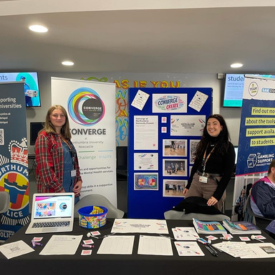-
Study
Study
Interested in studying at Northumbria? With 31,500 students, Northumbria is one of the largest universities in the country, offering courses on either a full-time, part-time or distance learning basis.
Discover more-
Undergraduate
- Undergraduate Study Degree
- Undergraduate Open Day & Events
- Application Guides
- Northumbria University UCAS Exhibitions
- Foundation Years
- Undergraduate Fees & Funding
- School & College Outreach
- Continuing Professional Development
-
Postgraduate
- Postgraduate Study Degree
- Postgraduate Research Degrees
- Postgraduate Open Days and Events
- Postgraduate Fees & Funding
- Flexible Learning
- Thinking about a Masters?
- Continuing Professional Development
- Change Direction
-
Student Life
- The Hub - Student Blog
- Accommodation
- Life in Newcastle
- Support for Students
- Careers
- Information for Parents
- Students' Union
- Northumbria Sport
-
-
International
International
Northumbria’s global footprint touches every continent across the world, through our global partnerships across 17 institutions in 10 countries, to our 277,000 strong alumni community and 150 recruitment partners – we prepare our students for the challenges of tomorrow. Discover more about how to join Northumbria’s global family or our partnerships.
Discover more-
Applying to Northumbria
- European Union
- Our London Campus
- Northumbria Pathway
- International Events
- Entry Requirements
- Agent Network
-
Northumbria Language Centre
- Faculty Requirements
- Acceptable English Requirements
- Pre-Sessional English and Study Skills
- Academic Language Skills Programmes (ALS)
-
International Fees, Funding & Scholarships
- International Undergraduate Fees
- International Undergraduate Funding
- International Masters Fees
- International Masters Funding
- International Postgraduate Research Fees
- International Postgraduate Research Funding
- International Money Matters
-
Life at Northumbria
- International student support
- The Hub - Student Blog
- Careers
-
International Mobility
- Current Northumbria Students
- Incoming Exchange Students
-
-
Business
Business
The world is changing faster than ever before. The future is there to be won by organisations who find ways to turn today's possibilities into tomorrows competitive edge. In a connected world, collaboration can be the key to success.
Discover more -
Research
Research
Northumbria is a research-rich, business-focused, professional university with a global reputation for academic quality. We conduct ground-breaking research that is responsive to the science & technology, health & well being, economic and social and arts & cultural needs for the communities
Discover more -
About Us
-
About Northumbria
- Our Strategy
- Our Staff
- Our Partners
- Student Profiles
- Alumni Profiles
- Leadership & Governance
- Academic Departments
- University Services
- History of Northumbria
- Contact us
- Online Shop
-
-
Alumni
Alumni
Northumbria University is renowned for the calibre of its business-ready graduates. Our alumni network has over 236,000 graduates based in 178 countries worldwide in a range of sectors, our alumni are making a real impact on the world.
Discover more - Work For Us
What will I learn on this module?
The Medical Academic Communication (MAC) module that will help you develop the academic and professional skills to be successful as a student and medical professional. You will build professional communication skills for writing professional emails and engaging in face-to-face oral communication with peers and professors. You will learn why and how to build an effective written argument within the medical context. You will practice reading strategies to improve your comprehension and critical reading skills. You will enhance the clarity of your communication by learning to write concisely.
How will I learn on this module?
This module combines self-directed learning with face-to-face engagement. Each week, you will either complete an individual activity or you will attend a synchronous session. You will learn through a variety of methods, including discussions, workshops, reading and writing exercises, collaborative learning, online learning, lectures, and reflection. This module places a strong emphasis on learning as a process; as such you will be provided feedback on all activities, and you are expected to incorporate that feedback in future activities. This is aligned with the assessment and feedback pillar in the program framework for Northumbria University. You will also interface with the electronic course management site where you will submit assignments and retrieve the resources posted for this module. This technology-enhanced environment also includes online quizzes, forum discussions, and interactive polling questions.
How will I be supported academically on this module?
Academic members of staff provide support during office hours and via email to clarify concepts and/or direct you to relevant resources. All teaching and assessment material is posted on the electronic course management site, and announcements regarding any changes in scheduled delivery will be posted on the module site and emailed to all students.
What will I be expected to read on this module?
All modules at Northumbria include a range of reading materials that students are expected to engage with. The reading list for this module can be found at: http://readinglists.northumbria.ac.uk
(Reading List service online guide for academic staff this containing contact details for the Reading List team – http://library.northumbria.ac.uk/readinglists)
What will I be expected to achieve?
Knowledge & Understanding :
Intellectual / Professional skills & abilities:
1. Demonstrate ability to clearly, concisely, accurately, and professionally express ideas in both oral and written communication
2. Demonstrate ability to apply analysis and reasoning skills to evaluate and apply information, improve reading comprehension, and develop strong arguments
3. Apply academic literacy skills to complete tasks and assignments.
Personal Values Attributes (Global / Cultural awareness, Ethics, Curiosity) (PVA):
4. Demonstrate ability to communicate in ways that meet the sociocultural norms within academic, professional and medical contexts
How will I be assessed?
Formative Assessments
You will complete formative assessments in the form of Directed Learning Activities (DLAs) as part of your assessment portfolios. These DLAs include independent work, in-class activities such as reading, writing and analysing. The DLAs will take approximately one hour per week and you will receive feedback electronically or in-class to aid in your learning. Your level of engagement with these tasks will be marked and will contribute to the final unit portfolio score (see below).
Summative Assessments
The assessment portfolio for each unit of study consists of two parts: (1) engagement both inside and outside the class and (2) performance on the end-of-unit assessment. The engagement component will assess attendance, in-class participation, and engagement with formative activities. The end-of-unit assessment will assess learning against standards. To pass each unit, you must score 80% on the engagement component and meet all standards on the the end-of-unit assessment.
Professional communication (portfolio) [MLO 1, 2, 3, 4]
1. Unit engagement: synchronous/asynchronous sessions and DLAs
2. End of unit assessment:
a. Write a professional email request on a given scenario (80-100 words)
b. Record a role play of office hours based on a given scenario (4-6mins)
Argument development (portfolio) [MLO 1, 2, 3, 4]
1. Unit engagement: Engagement with synchronous/asynchronous sessions and DLAs
2. End of unit assessment: Write an argumentative essay (600 words)
Critical reading (portfolio) [MLO 1, 2, 3, 4]
1. Unit engagement: synchronous/asynchronous sessions and DLAs
2. End of unit assessment: Demonstrate use of reading strategies through a thing aloud recording (8-10mins)
Concise writing (portfolio) [MLO 1, 2, 3, 4]
1. Unit engagement: synchronous/asynchronous sessions and DLAs
2. End of unit assessment:
a. Revise a given text to be more concise
b. Write an essay demonstrating use of concise language (200-250 words)
You will receive feedback electronically via the eLP for each assessment.
Pre-requisite(s)
N/A
Co-requisite(s)
N/A
Module abstract
Medical Academic Communication (MAC) is a unique module that helps you develop the academic literacy, language and communication skills, cultural competencies, and critical thinking skills that are vital for success not only in medical school, but in your future as a healthcare professional. Effective, culturally appropriate academic and professional communication skills are a crucial aspect of studying and practicing medicine. You are required to demonstrate academic literacy skills, critically read large volumes of text, and write clear and concise emails, arguments, and reports. MAC helps you develop these skills.
MAC covers four main topics: professional communication, argument development, critical reading and concise writing. MAC consists of a mix of independent study activities and synchronous, interactive sessions. This allows more class time to be spent collaborating with peers applying the new skills.
Course info
Credits 0
Level of Study Undergraduate
Mode of Study 4 Year Programme
Location City Campus, Northumbria University
City Newcastle
Start August or January
All information is accurate at the time of sharing.
Full time Courses are primarily delivered via on-campus face to face learning but could include elements of online learning. Most courses run as planned and as promoted on our website and via our marketing materials, but if there are any substantial changes (as determined by the Competition and Markets Authority) to a course or there is the potential that course may be withdrawn, we will notify all affected applicants as soon as possible with advice and guidance regarding their options. It is also important to be aware that optional modules listed on course pages may be subject to change depending on uptake numbers each year.
Contact time is subject to increase or decrease in line with possible restrictions imposed by the government or the University in the interest of maintaining the health and safety and wellbeing of students, staff, and visitors if this is deemed necessary in future.
Your Learning Experience
Find out about our distinctive approach at
www.northumbria.ac.uk/exp
Admissions Terms and Conditions
northumbria.ac.uk/terms
Fees and Funding
northumbria.ac.uk/fees
Admissions Policy
northumbria.ac.uk/adpolicy
Admissions Complaints Policy
northumbria.ac.uk/complaints














